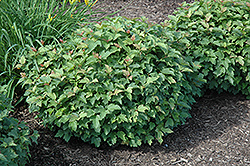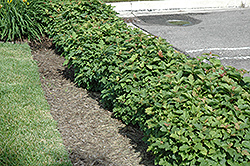Dwarf European Cranberry
Viburnum opulus 'Nanum'
Height: 3 feet
Spread: 4 feet
Sunlight:
![]()
![]()
Hardiness Zone: 3b
Other Names: European Highbush Cranberry
Description:
A dense, rigidly upright growing small shrub with good fall color, does not have the flowers or fruit of the species; hardy and adaptable, makes an excellent low hedge or garden background shrub, excellent in groupings
Ornamental Features
Dwarf European Cranberry is primarily valued in the garden for its ornamental globe-shaped form. It has dark green deciduous foliage. The serrated lobed leaves turn an outstanding red in the fall. The gold stems can be quite attractive.
Landscape Attributes
Dwarf European Cranberry is a dense multi-stemmed deciduous shrub with a more or less rounded form. Its relatively fine texture sets it apart from other landscape plants with less refined foliage.
This shrub will require occasional maintenance and upkeep, and can be pruned at anytime. Deer don't particularly care for this plant and will usually leave it alone in favor of tastier treats. Gardeners should be aware of the following characteristic(s) that may warrant special consideration;
- Insects
Dwarf European Cranberry is recommended for the following landscape applications;
- Mass Planting
- Hedges/Screening
- General Garden Use
Planting & Growing
Dwarf European Cranberry will grow to be about 3 feet tall at maturity, with a spread of 4 feet. It tends to fill out right to the ground and therefore doesn't necessarily require facer plants in front. It grows at a medium rate, and under ideal conditions can be expected to live for 40 years or more.
This shrub does best in full sun to partial shade. It prefers to grow in average to moist conditions, and shouldn't be allowed to dry out. It is not particular as to soil type or pH. It is highly tolerant of urban pollution and will even thrive in inner city environments. This is a selected variety of a species not originally from North America.


